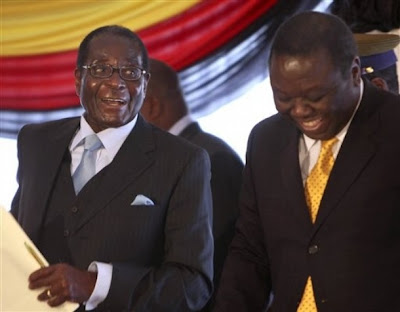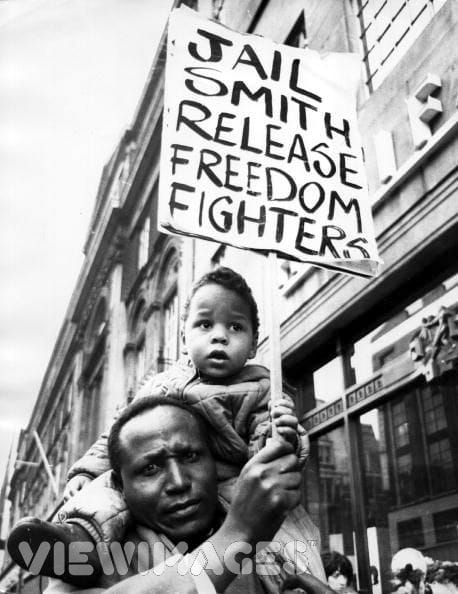ZANU-PF
Crisis in Zimbabwe -- a long walk to freedom! Latest issue of ISO Zimbabwe's `Socialist Worker'

Robert Mugabe (centre) and GNU partners Morgan Tsvangirai (left) and Arthur Mut
A mid-2011 election announced by Mugabe promises a return to outright violence and poll thievery.
By Patrick
Bond, Bulawayo
November 12, 2010 – Links International Journal of Socialist Renewal – If leaders of a small African country stand up with confidence to imperialist aggression, especially from the US and Britain, it would ordinarily strike any fair observer as extremely compelling. Especially when the nightmare of racist colonialism in that country is still be to exorcised, whites hold a disproportionate share of economic power and state’s rulers appear serious about changing those factors.
Zimbabwe: Liberation nationalism, old and born again

Zimbabwe: Struggle, dictatorship and the response of the social movements
By Leo Zeilig
June 28, 2010 – Zimbabwe’s economy has been in free fall. Between 2000 and 2005, the economy contracted by more than 40 per cent. Today GDP per capita is estimated to be the same as it was in 1953. Before the replacement of the Zimbabwe dollar with the US dollar and the South African rand in 2009, the country had the highest inflation rate in the world, soaring to 165,000 per cent in February 2008.
The legacy of anti-colonial struggles in Southern Africa: Liberation movements as governments

SWAPO's Sam Nujoma.
By Henning Melber
Southern Africa: The liberation struggle continues

[The following is the editorial in the latest edition of AfricaFile's At Issue Ezine, vol. 12 (May-October 2010), which examines the development of the southern African liberation movement-led countries. It has been posted at Links International Journal of Socialist Renewal with permission.]
By John S. Saul
Zimbabwe: Despite Mugabe's opportunism, radical land reform is necessary

Zimbabwe: Interviews -- The struggle for a people-driven constitution

July 25, 2009 -- The first All-Stakeholders' Conference aimed at drafting a new constitution in Zimbabwe was held in Harare on July 13-14. The constitutional reform process is the result of the agreement reached between President Robert Mugabe's Zimbabwe African National Union-Patriotic Front (ZANU-PF) and the Movement for Democratic Change (MDC), when they formed a power-sharing government in February 2009.
The agreement between ZANU-PF and the MDC sets an 18-month timeline for drafting the constitution. It mandates two so-called all-stakeholders’ conferences and national consultation, but the process is controlled by a parliamentary committee. The final draft is to be determined by parliament before going to a referendum.
Many in the pro-democracy movement believe the constitutional reform process is dominated by politicians and will fail to incorporate the demands of ordinary Zimbabweans suffering worst from the country’s social and economic crisis.
Zimbabwe: The struggle enters a new stage

Munyaradzi Gwisai of the ISOZ at the World at a Crossroads conference. Photo by Alex Bainbridge.
By Munyaradzi Gwisai
[Read or download the May 2009 issue of the ISOZ's newspaper, Socialist Worker, at the end of this article.]
May 6, 2009 -- The formation of the government of national unity (GNU) in Zimbabwe between the opposition Movement for Democratic Change (MDC) and Robert Mugabe's Zimbabwe African National Union-Patriotic Front (ZANU-PF) in February 2009 was the logical outcome of the agreement made between them in the middle of last year. The final negotiations had stalled as Mugabe tried to manipulate the details to exact maximum concessions from the MDC.
Zimbabwe socialists: Fight for fresh elections under a new people-driven constitution!

February 6, 2009 -- The International Socialist Organisation Zimbabwe (ISOZ) has consistently argued for the last few years that the poor and working people would pay dearly if they naively followed the false calls for “change” championed by the Movement for Democratic Change (MDC) and its imperialist-supported civic society allies, and subordinated their organisations to the same.
We called for the urgent establishment of a radical and anti-neoliberal united front of working people's organisations, to spearhead the struggle even when the opposition leadership eventually sold out. We argued that the MDC was preparing for a sell-out deal with Robert Mugabe's ruling Zimbabwe African National Union-Patriotic Front (ZANU-PF) as a junior partner and that Mugabe was now ready to accept this. Three years ago, we wrote:
Zimbabwe: How Morgan Tsvangirai saved the Mugabe regime

By Tendai Dumbutshena
February 2, 2009 -- After the June 27, 2008, putsch by Zimbabwe ruler Robert Mugabe signs were always there that the Movement for Democratic Change (MDC) was headed for surrender. It officially happened on January 30, 2009, when the party hoisted a white flag on top of its Harvest House headquarters. What followed was a pathetic attempt by MDC leader Morgan Tsvangirai to portray this decision to join the unity government without any of the MDC's conditions being met as some sort of victory.[Tsvangirai was sworn in as prime minister on February 11, 2009.]
Equally pathetic was a plea to Mugabe to be treated as an equal partner. There is a fat chance of that happening. The old tyrant must have chuckled when he heard this.
